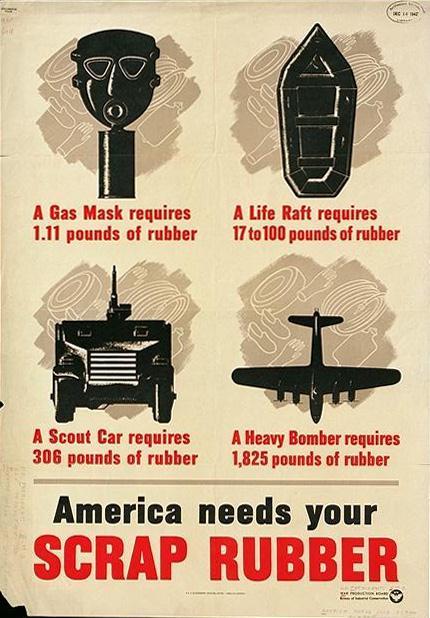America Needs Your Scrap Rubber
This U.S. Government poster from World War II illustrates the military need for rubber. Most of the world's supply of natural rubber came from rubber tree plantations in Southeast Asia, which were quickly occupied by the Japanese in the first months of 1942. Factories converting to military production needed every scrap of rubber they could find, and citizens were asked to turn in old tires, raincoats, gloves, garden hoses, and rubber shoes for recycling. New tires became almost impossible to buy, and people tell stories of lining the insides of their tires with newspaper to make them last longer.

United States: War Production Board; U.S. G.P.O. America needs your scrap rubber. 1942. Northwestern University Library. https://images.northwestern.edu/multiresimages/inu:dil-74caf432-463b-466... (Accessed December 7, 2018)
Public Domain
Public Domain is a copyright term that is often used when talking about copyright for creative works. Under U.S. copyright law, individual items that are in the public domain are items that are no longer protected by copyright law. This means that you do not need to request permission to re-use, re-publish or even change a copy of the item. Items enter the public domain under U.S. copyright law for a number of reasons: the original copyright may have expired; the item was created by the U.S. Federal Government or other governmental entity that views the things it creates as in the public domain; the work was never protected by copyright for some other reason related to how it was produced (for example, it was a speech that wasn't written down or recorded); or the work doesn't have enough originality to make it eligible for copyright protection.
Add a comment
PLEASE NOTE: NCpedia provides the comments feature as a way for viewers to engage with the resources. Comments are not published until reviewed by NCpedia editors at the State Library of NC, and the editors reserve the right to not publish any comment submitted that is considered inappropriate for this resource. NCpedia will not publish personal contact information in comments, questions, or responses. If you would like a reply by email, note that some email servers, such as public school accounts, are blocked from accepting messages from outside email servers or domains. If you prefer not to leave an email address, check back at your NCpedia comment for a reply. Please allow one business day for replies from NCpedia. Complete guidelines are available at https://ncpedia.org/about.